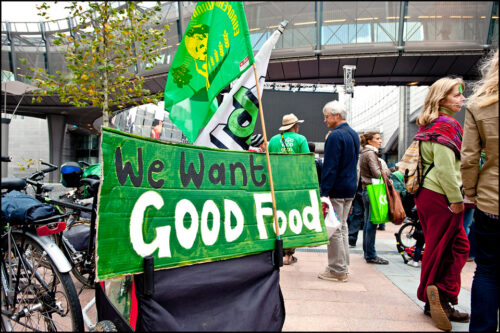Which apocalypse do you subscribe to? Plagues and Pestilences? Nuclear Armageddon? Fascist Putinism? The Sixth Extinction? Or just the plain old-fashioned Climate Catastrophe?
Apocalypticism seems to have become increasingly fashionable in the last decade. One reason is, that the idea of the End of the World has once again been fed to foster a political movement fuelled by the angry disenfranchised and seemingly oppressed people of the rural heartlands – the farmers, the males, the uneducated, and the other hopeless, fat trash and rabble circulating on the peripheries of the cities and their privileged meritocracies. As many have noted, this is a powder keg skilfully manipulated by modern despots and wannabee dictators like Putin, Orban and Trump. Apocalypses appear among the oppressed and are harnessed by the oppressors.
Unfortunately, disregard for the concerns of ordinary people among the elite tends to be the order of the day, leaving the little people with the choice of opting for either tragedy: passivism or dictatorial prevention. From this point of perspective, freedom and liberation form a phantasmagoria or utopia, while mushroom clouds and flooded landscapes invade our dreamscapes.
Positive Apocalypticism
Most political scientists and meritocrats will claim that the best way forward is to disregard the apocalypses floating around. By continuing to micromanage the system, we shall overcome the resistance and the uproar, they claim.
However, modern politicians who disregard this apocalyptic thinking are in danger of missing out on the point of the profound fright voiced by the people on the periphery. The question is not so much whether apocalypses are floating around and how to dispel them, but rather, which kinds of apocalypses (or concerns) are being floated. This is not the right way forward, argues Joe P. L. Davidson in a new article published in the American Political Science Review.
He claims that studies of various apocalypses – or worldquakes – are important to carry out. Concrete apocalyptic thinking offers valuable insights. He writes: “First, the end of the world is a means of interpreting the historical situation of oppression. It demonstrates the limitations on possibilities within the contours of current society, highlighting the fact that oppression is bound up with the social order in its totality… Secondly, the apocalypse from below functions as a “possibility-disclosing practice” aimed at keeping “the possibility of a different future open, resisting resignation and accommodation to what is”.
He argues that a scrutiny of the apocalypses floated from below – but not those from above – will reveal in what manner the present system oppresses the disenfranchised by identifying the hidden structure of the oppression. Unfortunately, he does not present examples of how this has been done in the past or present. By not supplying such examples, he miscalculates the need to analyse both types of apocalypses – those presented from below and those presented from above. One example may suffice.
The Sixth Extinction

One of the current apocalypses floating around is “The Sixth Extinction”, summarised as the imminent breakdown of our nature caused by the rapidly accelerating extinction of species of flora and fauna. Often claimed to be more threatening than the climate crisis, this particular apocalypse has its own circle of UN CUPs with appended herds of educated masses of NGOs, green politicians and business entrepreneurs vying for the development of the new market opportunities invoked by nature restoration, rewilding and the invocation of sustainable practices.
As with the climate crisis, this has created a widespread uproar among “little people”. Balancing between denial and anger, they lobby for their continued right to harvest and hunt, to uphold their free right of ways, and to inhabit nature with everything from musical festivals to huge sports events. In the bleak future where 30% of the globe is set aside for nature, they imagine being players in a kind of hunger games where only the well-situated, clever, and skilled people will survive – eating their pounder-burgers on the way – while the rest are left behind. As such they instinctively seem to know that there is a fundamental difference between the apocalypses imagined by the oppressed and the oppressors. For the former, they have already happened, while for the latter, they present a potentiality. While the former doom scroll, the latter prep themselves to weather the storm – or, alternatively, colonize Mars.
In this situation, the right wing of “Trumpist” European leaders have formulated a response to the ramifications of this particular apocalypse by voicing their fear for the future lack of food in a world where eight billion will grow to ten within the next 25 years. Currently, in Europe, political right-wing leaders have used the EU Nature Restoration Law to recruit European farmers to rebel in the streets of Brussels. Of course, this recruitment has been staged by the multi-corporal companies currently owning huge tracts of farms in Europe and living well off the subsidies paid out by the EU. As an example, the land in the former DDR Mecklenburg was farmed by cooperatives. After 1989, the workers on these cooperative farms were offered the opportunity to buy the land. Unfortunately, lacking funds, the land was taken over by large Western landowners. Today, 75% of the land is farmed in a highly industrialised fashion with a marginal rent per hectare but not per capital investment. This is a big business which would suffer significantly if the EU cut their CAP (the annual subsidies).
A careful examination of the challenges, however, shows that the future solution to this impending apocalypse – officially floated by the right-wing faction in the EU parliament – has already arrived. By harnessing futuristic tech – from vertical farming to stem cells, the technologies are already there. Yes, it demands a lot of clean energy and as yet a substantial technical innovative effort. Nevertheless, the possibility is there to free up significant tranches of land in Europe – and at the same time secure food for all. For instance, in Denmark, 15% of the land is farmed to produce fodder for cattle delivering milk to the dairy industry. This is more than 3000 times the amount of land needed to set up factories delivering the same amount of milk protein produced by yeast cells.
By literally looking at ONLY the apocalyptic discourse from below – and not how the professional doomsayers join up with the malcontents – we may miss the practical solutions to the fear and anger voiced by the people who seem to imagine the possibilities from a peasant perspective – framing their world as an “image of the limited good”, where the answer becomes one of providing more equity, more balance, and more respect through land-sharing. However, this will – emphatically – not solve the challenge of the impending and very real apocalypse called the Sixth Extinction. Looking at technical solutions, instead, it becomes possible to free up to 15-30% of land for nature restoration and rewilding while at the same time cleaning up the unhealthy system of subsidising a small handful of huge agricultural businesses. Suddenly a viable future of both restored ecosystems and room for other nature pursuits becomes possible.
However, this point of perspective does not surface without looking at the structure of the apocalypses wielded from both above and below. The trick is, as Davidson rightly writes, to unveil or reveal what apocalypses are about. However, we need to study the apocalypses voiced from both above and below to envision real solutions in a post-apocalyptic world. Neither, however, are defensible in their own right. The future calls for practical solutions to surmountable challenges. Not doom scrolling nor prepping.
Karen Schousboe
FEATURED PHOTO:
The Hunger Games is a series of young adult dystopian novels written by American author Suzanne Collins. The first three novels are part of a trilogy following teenage protagonist Katniss Everdeen, and the fourth book is a prequel set 64 years before the original.
The novels in the trilogy are titled The Hunger Games (2008), Catching Fire (2009), and Mockingjay (2010). Each was adapted for film, establishing The Hunger Games film series, with the film adaptation of Mockingjay split into two feature-length motion pictures. The first two books in the series were both New York Times best sellers, and Mockingjay topped all US bestseller lists upon its release. By the time the film adaptation of The Hunger Games was released in 2012, the publisher had reported over 26 million Hunger Games trilogy books in print, including movie tie-in books. © Murray Close
NOTES:
In anthropology, “limited good” is the theory commonly held in traditional societies that there is a limited amount of “good” to go around. In other words, the amount of land, money, etc. available is held to be finite, so every time one person profits, another loses.
Societies that subscribe to this philosophy tend to display strong levels of equality among members and to be strongly resistant to social change. The term was coined by George M. Foster in his 1965 article, Peasant Society and the Image of Limited Good. Foster, George M. (1965) Peasant Society and the Image of Limited Good, American Anthropologist New Series, Vol. 67, No. 2, Apr., pp. 293–315
SOURCE:
The Apocalypse from Below: The Dangerous Idea of the End of the World, the Politics of the Oppressed, and Anti-Anti-Apocalypticism
By Joe P. L. Davidson, University of Warwick, United Kingdom
In: Americal Political Science Review (2024) p. 1 – 13
Abstract
The apocalypse is frequently deployed by political movements, especially contemporary climate activists, to advance their causes. This article develops a framework for defending such invocations of the end of the world. With many other political theorists, I suggest that the apocalypse is a dangerous concept, not least because of its association with authoritarian accounts of history. However, we should not reject the apocalypse. I argue for a form of anti-anti-apocalypticism, using the criticisms directed against the concept as a launchpad to rethink it in viable terms. While acknowledging the value of different ways of defending the apocalypse, I highlight the importance of the causes of apocalyptic movements. Simply put, apocalypses from below are defensible because they have the capacity to clarify the political position of the oppressed and open new political possibilities for the group. By contrast, apocalypses from above, because they fail to fulfill these functions, are not.
